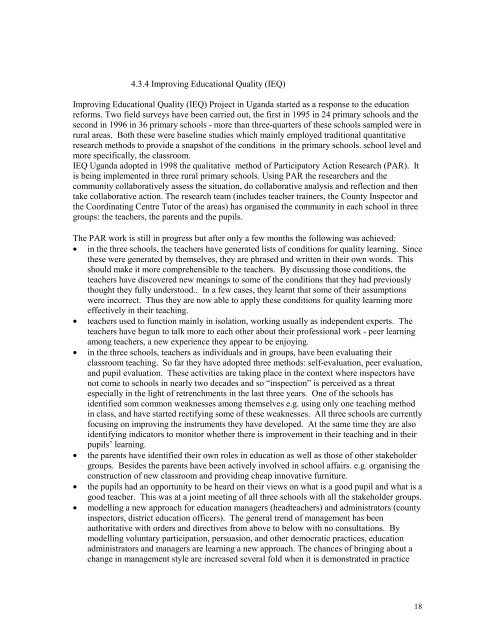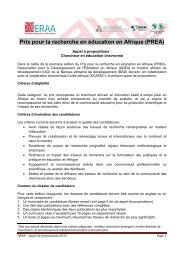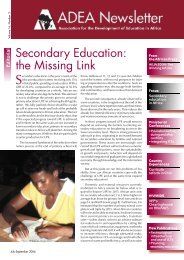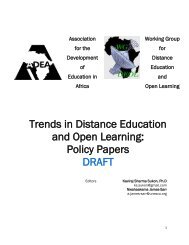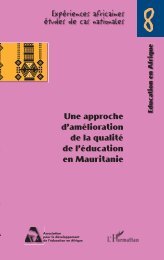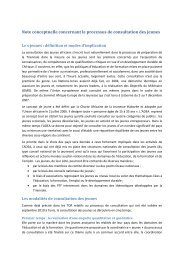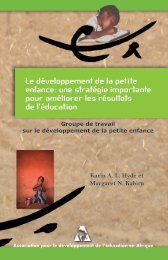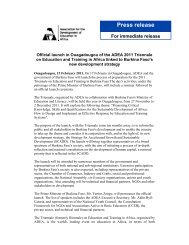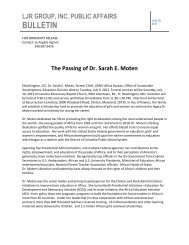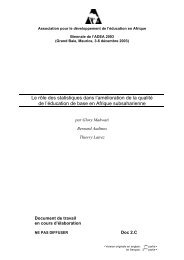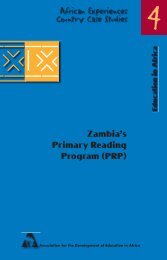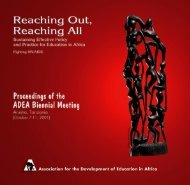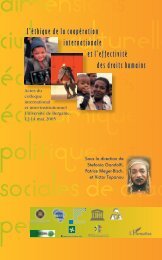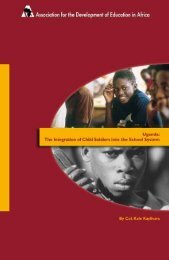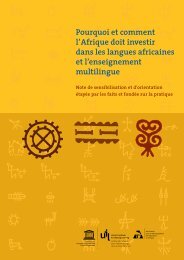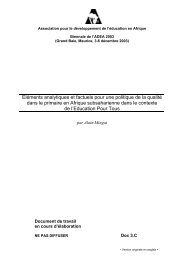the ugandan experience of universal primary education (upe) - ADEA
the ugandan experience of universal primary education (upe) - ADEA
the ugandan experience of universal primary education (upe) - ADEA
Create successful ePaper yourself
Turn your PDF publications into a flip-book with our unique Google optimized e-Paper software.
4.3.4 Improving Educational Quality (IEQ)<br />
Improving Educational Quality (IEQ) Project in Uganda started as a response to <strong>the</strong> <strong>education</strong><br />
reforms. Two field surveys have been carried out, <strong>the</strong> first in 1995 in 24 <strong>primary</strong> schools and <strong>the</strong><br />
second in 1996 in 36 <strong>primary</strong> schools - more than three-quarters <strong>of</strong> <strong>the</strong>se schools sampled were in<br />
rural areas. Both <strong>the</strong>se were baseline studies which mainly employed traditional quantitative<br />
research methods to provide a snapshot <strong>of</strong> <strong>the</strong> conditions in <strong>the</strong> <strong>primary</strong> schools. school level and<br />
more specifically, <strong>the</strong> classroom.<br />
IEQ Uganda adopted in 1998 <strong>the</strong> qualitative method <strong>of</strong> Participatory Action Research (PAR). It<br />
is being implemented in three rural <strong>primary</strong> schools. Using PAR <strong>the</strong> researchers and <strong>the</strong><br />
community collaboratively assess <strong>the</strong> situation, do collaborative analysis and reflection and <strong>the</strong>n<br />
take collaborative action. The research team (includes teacher trainers, <strong>the</strong> County Inspector and<br />
<strong>the</strong> Coordinating Centre Tutor <strong>of</strong> <strong>the</strong> areas) has organised <strong>the</strong> community in each school in three<br />
groups: <strong>the</strong> teachers, <strong>the</strong> parents and <strong>the</strong> pupils.<br />
The PAR work is still in progress but after only a few months <strong>the</strong> following was achieved:<br />
• in <strong>the</strong> three schools, <strong>the</strong> teachers have generated lists <strong>of</strong> conditions for quality learning. Since<br />
<strong>the</strong>se were generated by <strong>the</strong>mselves, <strong>the</strong>y are phrased and written in <strong>the</strong>ir own words. This<br />
should make it more comprehensible to <strong>the</strong> teachers. By discussing those conditions, <strong>the</strong><br />
teachers have discovered new meanings to some <strong>of</strong> <strong>the</strong> conditions that <strong>the</strong>y had previously<br />
thought <strong>the</strong>y fully understood.. In a few cases, <strong>the</strong>y learnt that some <strong>of</strong> <strong>the</strong>ir assumptions<br />
were incorrect. Thus <strong>the</strong>y are now able to apply <strong>the</strong>se conditions for quality learning more<br />
effectively in <strong>the</strong>ir teaching.<br />
• teachers used to function mainly in isolation, working usually as independent experts. The<br />
teachers have begun to talk more to each o<strong>the</strong>r about <strong>the</strong>ir pr<strong>of</strong>essional work - peer learning<br />
among teachers, a new <strong>experience</strong> <strong>the</strong>y appear to be enjoying.<br />
• in <strong>the</strong> three schools, teachers as individuals and in groups, have been evaluating <strong>the</strong>ir<br />
classroom teaching. So far <strong>the</strong>y have adopted three methods: self-evaluation, peer evaluation,<br />
and pupil evaluation. These activities are taking place in <strong>the</strong> context where inspectors have<br />
not come to schools in nearly two decades and so “inspection” is perceived as a threat<br />
especially in <strong>the</strong> light <strong>of</strong> retrenchments in <strong>the</strong> last three years. One <strong>of</strong> <strong>the</strong> schools has<br />
identified som common weaknesses among <strong>the</strong>mselves e.g. using only one teaching method<br />
in class, and have started rectifying some <strong>of</strong> <strong>the</strong>se weaknesses. All three schools are currently<br />
focusing on improving <strong>the</strong> instruments <strong>the</strong>y have developed. At <strong>the</strong> same time <strong>the</strong>y are also<br />
identifying indicators to monitor whe<strong>the</strong>r <strong>the</strong>re is improvement in <strong>the</strong>ir teaching and in <strong>the</strong>ir<br />
pupils’ learning.<br />
• <strong>the</strong> parents have identified <strong>the</strong>ir own roles in <strong>education</strong> as well as those <strong>of</strong> o<strong>the</strong>r stakeholder<br />
groups. Besides <strong>the</strong> parents have been actively involved in school affairs. e.g. organising <strong>the</strong><br />
construction <strong>of</strong> new classroom and providing cheap innovative furniture.<br />
• <strong>the</strong> pupils had an opportunity to be heard on <strong>the</strong>ir views on what is a good pupil and what is a<br />
good teacher. This was at a joint meeting <strong>of</strong> all three schools with all <strong>the</strong> stakeholder groups.<br />
• modelling a new approach for <strong>education</strong> managers (headteachers) and administrators (county<br />
inspectors, district <strong>education</strong> <strong>of</strong>ficers). The general trend <strong>of</strong> management has been<br />
authoritative with orders and directives from above to below with no consultations. By<br />
modelling voluntary participation, persuasion, and o<strong>the</strong>r democratic practices, <strong>education</strong><br />
administrators and managers are learning a new approach. The chances <strong>of</strong> bringing about a<br />
change in management style are increased several fold when it is demonstrated in practice<br />
18


